Articles
- Page Path
- HOME > J Korean Acad Nurs > Volume 43(6); 2013 > Article
-
Review Article
- Validity of Instrument Development Research in Korean Nursing Research
- Kyunghee Lee, Sujin Shin
-
Journal of Korean Academy of Nursing 2013;43(6):697-703.
DOI: https://doi.org/10.4040/jkan.2013.43.6.697
Published online: December 31, 2013
1Division of Nursing Science, College of Health Science, Ewha Woman's University, Seoul, Korea.
2Department of Nursing, College of Medicine, Soonchunhyang University, Cheonan, Korea.
- Address reprint requests to: Shin, Sujin. Department of Nursing, College of Medicine, Soonchunhyang University, 31 Soonchunhyang 6th Rd., Dongnam-gu, Cheonan 330-100, Korea. Tel: +82-41-570-2491, Fax: +82-41-574-3860, ssj1119@sch.ac.kr
• Received: October 1, 2013 • Accepted: November 15, 2013
© 2013 Korean Society of Nursing Science
Abstract
-
Purpose
- This integrative review study was done to analyze methods used for validation studies in Korean nursing research.
-
Methods
- In this study, the literature on instrument development in nursing research from Research Information Sharing Service (RISS) and major nursing journal databases in Korea were examined. The MeSH search terms included 'nursing', 'instrument', 'instrument development', 'validation' and 189 articles were included in the review.
-
Results
- The most frequently reported validity type was content validity, followed by construct validity, and criterion validity. One third reported a single type of validity, and 15% of the studies demonstrated three kinds of validity at the same time. In about 40% of the studies, both content and construct validity were examined.
-
Conclusion
- The results of the study indicate that it is necessary to provide a wider variety of evidence to establish whether instruments are valid enough to use in nursing research.
- 1. American Educational Research Association [AERA]. American Psychological Association [APA]. National Council on Measurement in Education [NCME]. The standards for educational and psychological testing. Washington, DC: AERA Publications; 1999.
- 2. Campbell DT, Fiske DW. Convergent and discriminant validation by the multitrait-multimethod matrix. Psychol Bull. 1959;56(2):81–105. http://dx.doi.org/10.1037/h0046016ArticlePubMed
- 3. Carnevale T. An integrative review of adolescent depression screening instruments: Applicability for use by school nurses. J Child Adolesc Psychiatr Nurs. 2011;24(1):51–57. http://dx.doi.org/10.1111/j.1744-6171.2010.00256.xArticlePubMed
- 4. Choi SH, Lee EJ, Park MJ, Kim HS, Kim MH, Choi JY. Nursing outcomes measurement indicators. Gwangju: Chonnam National University Press; 2012.
- 5. Choi SJ, Bae SY, Choi JY, Bang HJ. Development and predictive validity of pressure ulcer predicting scale for patients with neurologic condition. Clin Nurs Res. 2006;11(1):95–108.
- 6. Cronbach LJ, Meehl PE. Construct validity in psychological tests. Psychol Bull. 1955;52(4):281–302.ArticlePubMed
- 7. DeVellis RF. Scale development: Theory and applications. 2nd ed. Thousand Oaks, CA: Sage Publications, Inc; 2003.
- 8. DeVellis RF. Scale development: Theory and applications. 3rd ed. Newbury Park, CA: Sage Publications, Inc; 2011.
- 9. Foster RL, Park JH. An integrative review of literature examining psychometric properties of instruments measuring anxiety or fear in hospitalized children. Pain Manag Nurs. 2012;13(2):94–106. http://dx.doi.org/10.1016/j.pmn.2011.06.006ArticlePubMed
- 10. Gronlund NE, Linn RL. Measurement and evaluation in teaching. 6th ed. New York, NY: Macmillan Publishing Company; 1990.
- 11. Hopfenbecka TN, Maul A. Examining evidence for the validity of PISA learning strategy scales based on student response processes. Int J Test. 2011;11(2):95–121. http://dx.doi.org/10.1080/15305058.2010.529977Article
- 12. Ju HO, Lee NY, Park IS, Lee SO, Kim SH. Development & validation of a checklist for infant and child developmental screening. J Korean Acad Child Health Nurs. 2009;15(1):34–41. http://dx.doi.org/10.4094/jkachn.2009.15.1.34Article
- 13. Kane MT. Current concerns in validity theory. J Educ Meas. 2000;38(4):319–342. http://dx.doi.org/10.1111/j.1745-3984.2001.tb01130.xArticle
- 14. Kang H. A guide on the use of factor analysis in the assessment ofconstruct validity. J Korean Acad Nurs. 2013;43(5):587–594. http://dx.doi.org/10.4040/jkan.2013.43.5.587ArticlePubMed
- 15. Kim KN, Kim CH, Kim KI, Yoo HJ, Park SY, Park YH. Development and validation of the Korean nursing delirium scale. J Korean Acad Nurs. 2012;42(3):414–423. http://dx.doi.org/10.4040/jkan.2012.42.3.414ArticlePubMed
- 16. Lee EO, Im NY, Park HA, Lee IS, Kim JI, Bae J, et al. Nursing research and statistical analysis. 4th ed. Paju: Soomoonsa; 2009.
- 17. Lee I, Park YI, Park E, Lee SH, Jeong IS. Validation of instruments to classify the frailty of the elderly in community. J Korean Acad Community Health Nurs. 2011;22(3):302–314.Article
- 18. Lee W. Unified view on validity. J Educ Eval. 2008;21(4):67–79.
- 19. Park HA. Problem and issues in developing measurement scales in nursing. Korean J Nurs Query. 2005;14(1):46–72.
- 20. Pett MA, Lackey NR, Sullivan JJ. Making sense of factor analysis: The use of factor analysis for instrument development in health care research. Thousand Oaks, CA: Sage Publications, Inc; 2003.
- 21. Ribeiro MAS, Vedovato TG, de Moraes Lopes MHB, Monteiro MI, de Brito Guirardello E. Validation studies in nursing: Integrative review. Rev Rene. 2013;14(1):218–228.Article
- 22. Seong TJ. Validity and reliability. Seoul: Hakjisa Publisher; 2002.
- 23. Shin H, Kim J, Lim S. A study to validate the Korean child development review. J Korean Acad Child Health Nurs. 2007;13(2):222–229.
- 24. Shin H, Kwon B, Lim S. Validity of Korean version of denver II in screening children with developmental risk. Korean J Child Health Nurs. 2005;11(3):316–321.
- 25. So AY, Cho BH. Development of a home care need assessment tool: Focused on home care nursing diagnoses based on self care. J Korean Acad Community Health Nurs. 2002;13(3):433–443.
- 26. Waltz CF, Strickland OL, Lenz ER. Measurement in nursing and health research. 4th ed. New York, NY: Springer Publishing Company; 2010.
REFERENCES
Figure & Data
REFERENCES
Citations
Citations to this article as recorded by 

- A Comparison of the Importance, Satisfaction, and Barrier Levels of Communication Performance between Family Members and Staff Nurses in Intensive Care Units
Haetsal Hong, Myoungock Jang
Journal of Korean Critical Care Nursing.2025; 18(1): 55. CrossRef - Assessing the Development and Validity of Educational Videos in Educating Dental Infection Control Coordinators
Na‐Young Lee, Han‐Na Kim
International Journal of Dental Hygiene.2025; 23(4): 643. CrossRef - Development of a scale to measure fear of falling in older adults: a psychometric validation study
Dayeon Lee, Sunghee H Tak
Journal of Korean Academy of Nursing.2025; 55(3): 413. CrossRef - Development of an end-of-life care competency scale for nurses in long-term care hospitals: a psychometric validation study
Sookyeon Son, Mi-Kyeong Jeon
Journal of Korean Academy of Nursing.2025; 55(4): 598. CrossRef - Development of nursing handoff competency scale: a methodological study
Jiyoung Do, Sujin Shin
BMC Nursing.2024;[Epub] CrossRef - Development of Maternal Adaptation Scale for the Primipara Women
Jungmi Ko, Ju-Eun Song
Journal of Korean Maternal and Child Health.2024; 28(2): 51. CrossRef - Translation and psychometric validation of the Korean version of the academic nurse self-efficacy scale for Korean bachelor-level nursing students
Eunkyung Lee, Jin-Hwa Park
Frontiers of Nursing.2024; 11(2): 209. CrossRef - Digital therapeutics in Korea: current status, challenges, and future directions – a narrative review
Hee Jun Shin, Ik Tae Cho, Wan Suk Choi, Hong Rae Kim, Min Bong Kang, Won Jong Yang
Journal of Yeungnam Medical Science.2024; 42: 8. CrossRef - Validation of the Korean Version of Patient-Centered Care Tool: For Outpatients
Yeo Ju Kim, Gunjeong Lee, Sunyeob Choi
Patient Preference and Adherence.2023; Volume 17: 1525. CrossRef - The Development and Evaluation of the Online Respiratory Infectious Disease Nursing Simulation Course for Nursing Students
Jisu Lee, Hye Won Yoon
Journal of Korea Society for Simulation in Nursing.2023; 11(2): 91. CrossRef - Properties of Patient-Reported Outcome Measures for Post-Traumatic Stress Disorder in North Korean Defectors: A Scoping Review
Ocksim Kim, Kyoung-A Kim, Sang Hui Chu
Psychiatry Investigation.2023; 20(7): 593. CrossRef - Evaluation of the reliability and validity of the health regulatory focus scale in Chinese samples
Xiaokang Lyu, Tingting Yang, Yanqin Fan, Haijuan Hong, Chunye Fu
Frontiers in Psychology.2023;[Epub] CrossRef - Psychometric Properties of the Korean Version of Self-Efficacy for HIV Disease Management Skills
Gwang Suk Kim, Layoung Kim, Mi-So Shim, Seoyoung Baek, Namhee Kim, Min Kyung Park, Youngjin Lee
Journal of Korean Academy of Nursing.2023; 53(3): 295. CrossRef - Psychometric Properties of the Korean Version of the Environmental Health Literacy Scale
Jung-Min Kwak, Ju-Hee Kim
International Journal of Environmental Research and Public Health.2022; 19(7): 4079. CrossRef - Translation and Psychometric Evaluation of the Female Sexual Resourcefulness Scale (FSRS) in South Korea
Jungmin Lee, Yoonjung Kim
Psychology Research and Behavior Management.2022; Volume 15: 2357. CrossRef - Development of Critical Reflection Competency Scale for Clinical Nurses
Sujin Shin, Eunmin Hong, Jiyoung Do, Mee Sun Lee, Youngsun Jung, Inyoung Lee
International Journal of Environmental Research and Public Health.2022; 19(6): 3483. CrossRef - The Validity and Reliability of the Korean Version of Readiness for Practice Survey for Nursing Students
Tae Wha Lee, Yoonjung Ji, Yea Seul Yoon
Journal of Korean Academy of Nursing.2022; 52(6): 564. CrossRef - Validating the use of the Wijma Delivery Expectancy/Experience Questionnaire in Mainland China: a descriptive, cross-sectional study
Lu Han, Jiaxin Wu, Hengchang Wu, Jun Liu, Yanqun Liu, Zhijie Zou, Juan Liu, Jinbing Bai
BMC Pregnancy and Childbirth.2022;[Epub] CrossRef - Impact of pressure ulcer prevention knowledge and attitude on the care performance of long-term care facility care workers: a cross-sectional multicenter study
Sae-Beul Lee, Hyang-Yuol Lee
BMC Geriatrics.2022;[Epub] CrossRef - A Scoping Review of Instruments for Measuring Problem-Solving Ability in Simulation Nursing Education in Korea: A Focus on Process Behavior Survey
Ancho Lim, Youngshin Song
Journal of Korean Academy of Fundamentals of Nursing.2022; 29(3): 269. CrossRef - Validity and Reliability of the Korean Version of the Cyberbullying Scale for Newly Graduated Nurses
Eun-Young Kim, Na-Ri Kim
Journal of Korean Academy of Nursing Administration.2021; 27(4): 282. CrossRef - The Development and Validation of a Perceived Nursing Support Scale for Mothers of Preterm Infants
Mihae Im, Jina Oh
Asian Nursing Research.2021; 15(5): 317. CrossRef - Development of a Korean version of the Bereavement Care Confidence Scale (K-BCCS)
So-Hi Kwon, Young-Joo Kim
The Journal of Korean Academic Society of Nursing Education.2021; 27(2): 197. CrossRef - The Psychological Responses of Nurses Caring for COVID-19 Patients: A Q Methodological Approach
Kyung Hyeon Cho, Boyoung Kim
International Journal of Environmental Research and Public Health.2021; 18(7): 3605. CrossRef - The Effect of Educational Training on Surgical Site Infection Management for Operating Room Nursing Staff
Yeon-Jeong Heo, So-Hee Nam, Hye-Jin Hyun
Quality Improvement in Health Care.2021; 27(2): 83. CrossRef - Validation of the Korean Version of the Nursing Profession Self-Efficacy Scale: A Methodological Study
Jina Oh, Haeryun Cho, Yae Young Kim, So Yeon Yoo
International Journal of Environmental Research and Public Health.2021; 18(3): 1080. CrossRef - Development and Validation of a Self-control Competency Scale for Late-school-aged Children
Bo Kyoung Jin, Hye Young Ahn
Child Health Nursing Research.2020; 26(4): 411. CrossRef - Development of the Forensic Nursing Competency Scale for Nurses
Na Young Jo, Min Hye Kim, Yun Mi Lee
Journal of Korean Critical Care Nursing.2020; 13(3): 24. CrossRef - Analysis of Equivalence and Reliability of Korean Translated Abbreviated Profile of Hearing Aid Benefits
Taehwa Kim, Jinsook Kim
Audiology and Speech Research.2020; 16(3): 175. CrossRef - Validity and Reliability of the Korean Version of the Ethical Sensitivity Questionnaire for Nursing Students
Hye Young Min, Yoon Jung Kim, Jung Min Lee
Journal of Korean Academy of Community Health Nursing.2020; 31(4): 503. CrossRef - Reliability and Validity of Korean Version of Nursing Students' Anxiety and Self-Confidence with Clinical Decision Making Scale
Mi Yu, Young Eun, KA White, KyungJa Kang
Journal of Korean Academy of Nursing.2019; 49(4): 411. CrossRef - Translation and validation of the Korean version of the Diabetic Foot Ulcer Scale‐Short Form
Ye‐Na Lee
International Wound Journal.2019; 16(S1): 3. CrossRef - Feasibility Test of Smartphone Application for Activity Daily Living by Chronic Stroke Patients
Chae-won Jung, Yo-Han Song, Hyun-Min Lee
Journal of The Korean Society of Physical Medicine.2019; 14(1): 151. CrossRef - Validity and Reliability of the Transition Shock Scale for Undergraduate Nursing Students
Soo Yeon Kim, Yong Soon Shin
Journal of Korean Academic Society of Nursing Education.2019; 25(1): 17. CrossRef - Validity and Reliability of the Korean Version of the Partners In Health Scale (PIH-K)
Mi-Kyeong Jeon, Jung-Won Ahn, Yeon-Hwan Park, Mi-Kyoung Lee
Journal of Korean Critical Care Nursing.2019; 12(2): 1. CrossRef - Development of Pregnancy Risk Symptom Perception Scale
Mi Heyi Kim, So Young Choi
Korean Journal of Women Health Nursing.2018; 24(3): 297. CrossRef - Validity and Reliability of the Korean Version of the Families’ Importance in Nursing Care-Pediatric Nurses’ Attitudes Instrument
Jina Oh, Yae Young Kim, So Yeon Yoo, Haeryun Cho
Child Health Nursing Research.2018; 24(3): 274. CrossRef - Validity and Reliability of the Korean Version Scale of the Clinical Learning Environment, Supervision and Nurse Teacher Evaluation Scale (CLES+T)
Sun-Hee Kim, So Yeon Yoo, Yae Young Kim
Journal of Korean Academy of Nursing.2018; 48(1): 70. CrossRef - The reliability and validity of instruments measuring pattern identification in Korean medicine: A systematic review
Mi Mi Ko, Myeong Soo Lee, Stephen Birch, Ju Ah Lee
European Journal of Integrative Medicine.2017; 15: 47. CrossRef - Reliability and Validity of the Korean Version of the Perinatal Post-Traumatic Stress Disorder Questionnaire
Yu Kyung Park, Hyeon Ok Ju, Hunjoo Na
Journal of Korean Academy of Nursing.2016; 46(1): 29. CrossRef - Development and Psychometric Evaluation of the Transcultural Self-efficacy Scale for Nurses
Won-Oak Oh, Eun Sook Park, Min Hyun Suk, Yeo Jin Im
Journal of Korean Academy of Nursing.2016; 46(2): 293. CrossRef - Development of a Wellness Index for Workers
Moon-Jong Choi, Chang-Sik Son, Jinsu Kim, Yeongmi Ha
Journal of Korean Academy of Nursing.2016; 46(1): 69. CrossRef - Development of Workplace Bullying in Nursing-Consequence Inventory (WPBN-CI)
Younju Lee
Journal of the Korea Academia-Industrial cooperation Society.2016; 17(2): 479. CrossRef - Development and Clinical Validity of a Mild Vascular Cognitive Impairment Assessment Tool for Korean Stroke Patients
Hyun Soo Oh, Ji Sun Kim, Eun Bi Shim, Wha Sook Seo
Asian Nursing Research.2015; 9(3): 226. CrossRef - A Validation Study of the Modified Korean Version of Ethical Leadership at Work Questionnaire (K-ELW)
Jeong-Eon Kim, Eun-Jun Park
Journal of Korean Academy of Nursing.2015; 45(2): 240. CrossRef - Development of the Resilience Scale for Korean Nursing College Students
Young Hee Yang, Eun Man Kim, Mi Yu, Seungmi Park, Haeyoung Lee
Korean Journal of Adult Nursing.2015; 27(3): 337. CrossRef - Construct Validity of the Life Transition Scale for Parents of Children with Autism
Ae Ran Lee, Sun Woo Hong, Se Jin Ju
Journal of Korean Academy of Nursing.2014; 44(5): 563. CrossRef - Reliability and Validity of Korean Geriatric Anxiety Inventory(K-GAI)
Jiyun Kim, Myung Sook Park, Doo Nam Oh
Journal of muscle and joint health.2014; 21(1): 75. CrossRef
Validity of Instrument Development Research in Korean Nursing Research
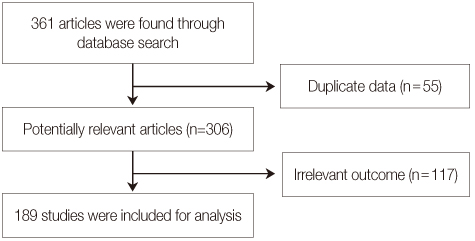
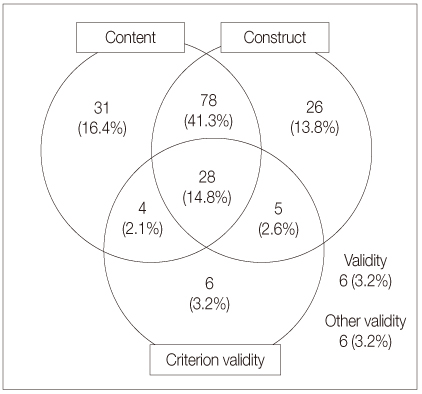
Figure 1
Article selection process flowchart.
Figure 2
Proportion of reported validity.
Figure 1
Figure 2
Validity of Instrument Development Research in Korean Nursing Research
Characteristics of Studies (N=189)
Type of Validity in Selected Studies (N=189)
CVI=Content validity index; EFA=Exploratory factor analysis; CFA=Confirmatory factor analysis.
Sensitivity and Specificity Studies
Table 1
Characteristics of Studies (N=189)
Table 2
Type of Validity in Selected Studies (N=189)
CVI=Content validity index; EFA=Exploratory factor analysis; CFA=Confirmatory factor analysis.
Table 3
Sensitivity and Specificity Studies
 KSNS
KSNS
 E-SUBMISSION
E-SUBMISSION


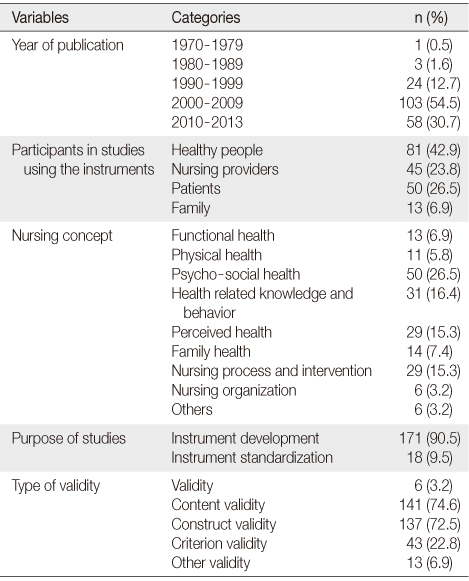
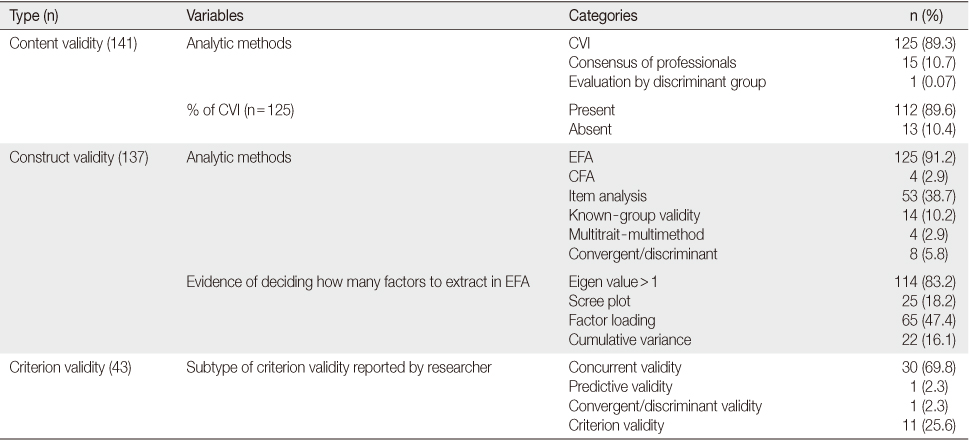
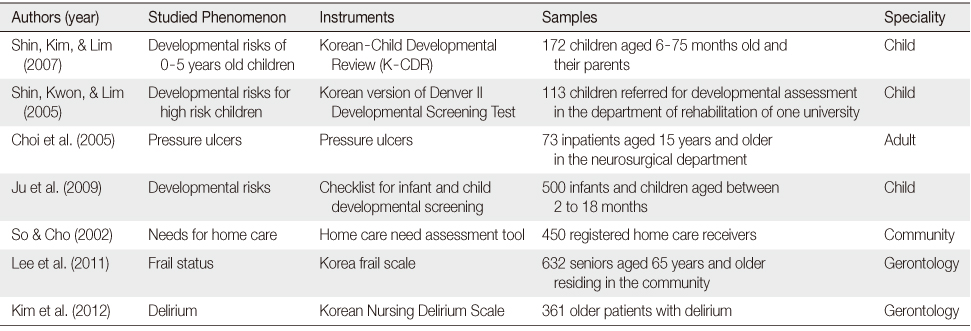
 Cite
Cite

